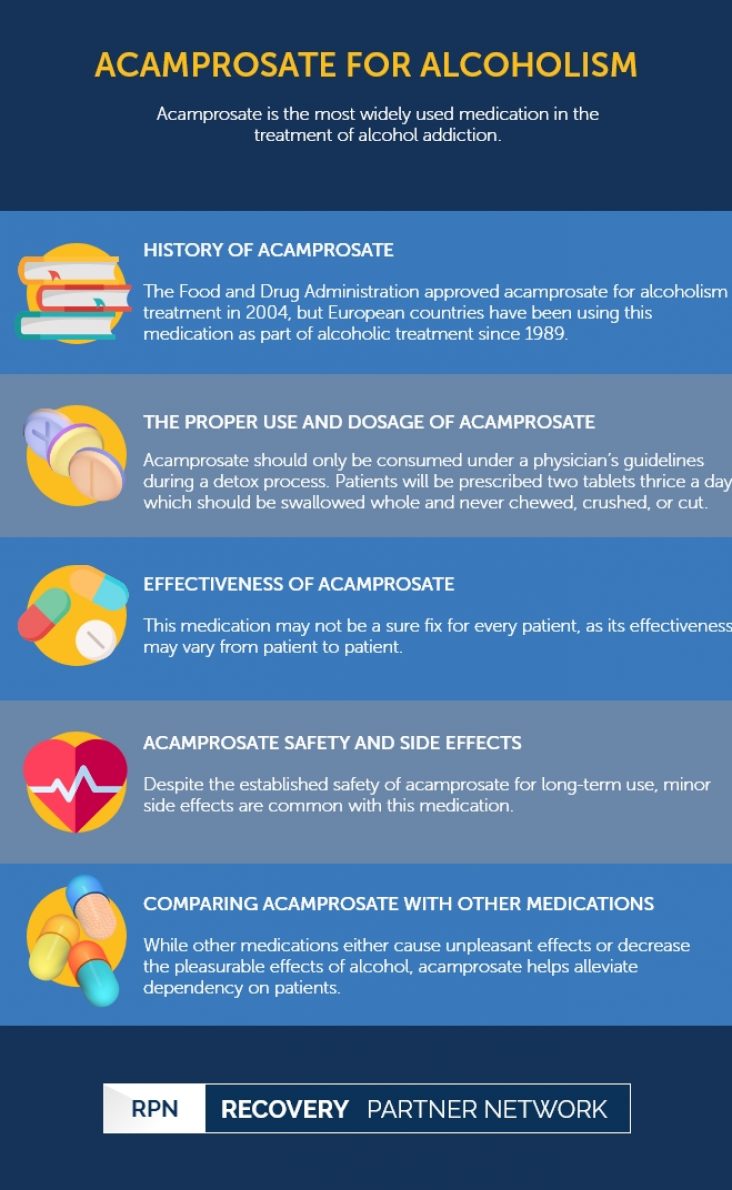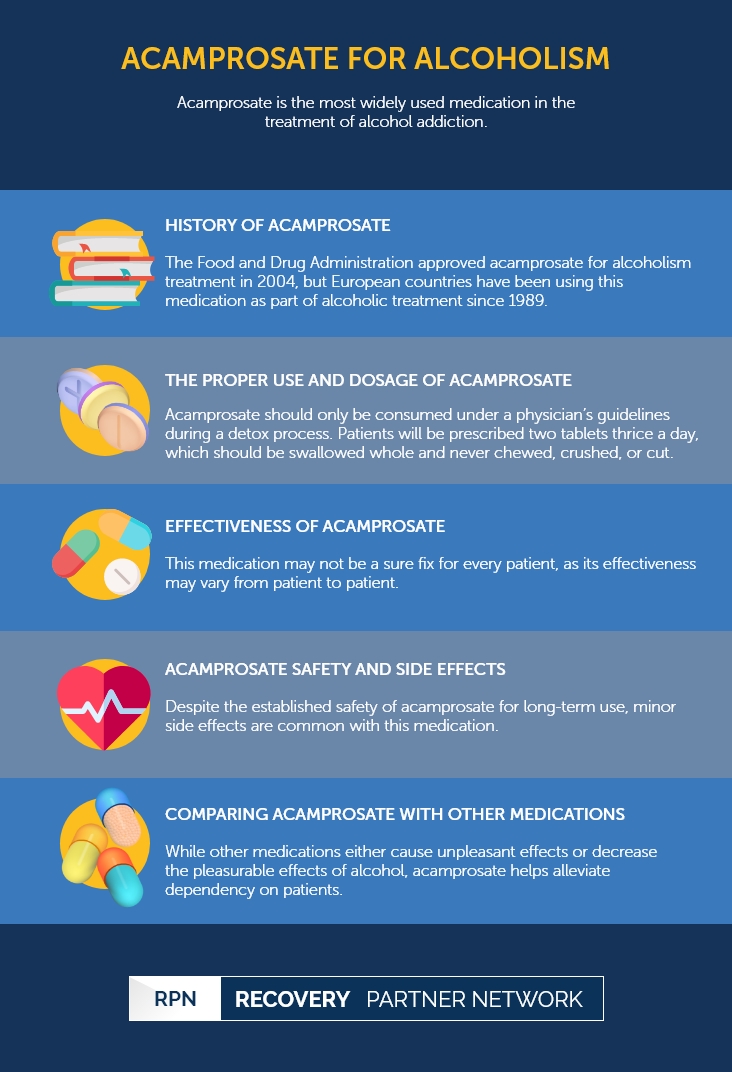Acamprosate is the most widely used medication in the treatment of alcohol addiction.
Acamprosate for Alcoholism
Acamprosate for Alcoholism | Table of Contents
Acamprosate in Alcoholism Treatment
Often referred to by its brand name Campral, it is among the three medications licensed by the Food and Drug Administration (FDA) for the treatment of alcoholism. Acamprosate is perhaps the most commonly prescribed medication in the United States for alcohol addiction recovery. Unlike most alcohol treatment medications that function by minimizing the pleasurable effects of alcohol or inducing strong deterrent side effects, acamprosate simply decreases the brain’s dependency on alcohol.
Prolonged alcohol consumption can adversely affect the brain’s chemistry and function. These chemical changes intensify depending on the duration of abuse and the severity of the addiction. If alcohol is no longer entering the bloodstream, the brain is no longer able to act in the same manner that it has grown accustomed to. This stage of alcohol abuse causes the development of dependence. The chemical imbalance caused by the lack of alcohol in the system can cause uncomfortable and intense symptoms of withdrawal. The withdrawal of alcohol may vary in intensity depending on the severity of one’s addiction. Withdrawal symptoms can sometimes be traumatic and life-threatening in some cases.
Acamprosate interacts with the brain’s neurotransmitter glutamate and gamma-aminobutyric acid (GABA) systems. Although the precise process by which acamprosate functions are yet unknown, the medication tends to adjust and normalize brain function that has been impaired by the absence of alcohol. Acamprosate helps alleviate withdrawal symptoms such as insomnia, anxiety, and restlessness.
Unlike alternative medications to cure alcoholism, acamprosate is broken down by the digestive tract rather than the liver. This makes the drug useful for patients struggling with liver-related health complications induced by alcoholism.
FAQ
Acamprosate is a medication used for treating alcohol dependence.
History of Acamprosate
Although the Food and Drug Administration approved acamprosate for the treatment of alcoholism in 2004, European countries have been using this medication as part of alcoholic treatment since 1989. Since then, it has helped more than 1.5 million individuals globally relieve their withdrawal effects of alcohol during treatment.
FAQ
Although acamprosate and naltrexone are used in the treatment of alcohol addiction, they are not the same. Acamprosate is more effective in promoting abstinence, while naltrexone is effective in reducing cravings.
Acamprosate is not a controlled substance.
The Proper Use and Dosage of Acamprosate
Acamprosate can only be administered during the detoxification process of alcohol addiction treatment. Acamprosate is a prescription medication that should only be consumed under the strict guidelines of a physician. This medication should be avoided during pregnancy or when diagnosed with kidney complications. Acamprosate alone is not a cure for alcoholism. The treatment process would also require the integration of counseling and other medications like Naltrexone and Disulfiram. The combination of these medications improve the potency of acamprosate, but not generally the potency of other medications.
Acamprosate is generally available in 333 mg tablets. During treatment, the patients will be prescribed two tablets thrice a day. As these medications are time-release tablets, they have to be swallowed whole and never chewed, crushed, or cut.
Since the drug’s adverse effects are minimal and are not addictive, it is typically prescribed for up to 12 months following cessation of alcohol intake. However, the duration of each patient’s prescription may depend on the severity of their alcohol addiction and withdrawal.
Effectiveness of Acamprosate
Acamprosate is only effective as a treatment for alcohol addiction when it is combined with other aspects of a treatment program such as therapy, counseling, and the active involvement in support groups. However, this medication may not be a sure fix for every patient as its effectiveness varies from patient to patient.
Acamprosate Safety and Side Effects
Multiple studies have shown that acamprosate is safe for long-term use as it is not an addictive drug. This feature makes it a sound choice for patients with a history of substance abuse. Tolerability is another beneficial feature of acamprosate. About 50% of AUD patients usually discontinue the drug within one year. According to the Agency for Healthcare Research and Quality,, the drug’s tolerability without adverse and long-term side effects make it an ideal medication as a long term treatment option. However, acamprosate is contraindicated in patients with serious renal failure, although reduced doses can be administered in less serious cases.
Despite the established safety of acamprosate’s long-term usage, side effects are common with any medication. Many of the side effects of acamprosate are minor and decrease in intensity the longer the treatment continues. It is this relative lack of side effects that makes the medication a more common option than alternatives. This is particularly the case when it comes to side effects linked to the liver.
Side effects of acamprosate may include:
- Diarrhea
- Dizziness
- Flatulence
- Headaches
- Dry mouth
- Insomnia
- Itchiness
- Nausea and vomiting
- Profuse sweating
- Loss of appetite
Although not common, this medication can cause severe side effects in certain patients. Theses side effects may include:
- Anxiety
- Depression
- Chest pain
- Suicidal thoughts
- Difficulty urinating
- Tingling sensations
FAQ
- Does acamprosate help with anxiety?
- What are the side effects of acamprosate?
- Can acamprosate cause weight gain?
- Does acamprosate make you sick?
- How does acamprosate affect the brain?
- Can acamprosate cause diarrhea?
Acamprosate reduces symptoms of anxiety that occur after quitting alcohol by restoring the balance of the brain’s neurotransmitters.
Some of the side effects of acamprosate include loss of appetite, nausea, stomach pain, diarrhea, vomiting, gas, constipation, drowsiness, headache, muscle or joint pain, decreased sexual ability, change in sexual desire, fatigue, and weight gain or loss.
Yes, acamprosate may cause weight gain.
Acamprosate does cause side effects such as gastrointestinal symptoms, which are usually mild and resolve within the first few weeks of treatment.
Acamprosate activates the release of taurine in the brain. This causes a decrease in neuronal hyperexcitability during early withdrawal.
Diarrhea is one of the most frequent side effects of acamprosate and is severe and persistent in some patients than others.
Benefits of Acamprosate
- Absorbed by the digestive tract rather than the liver, improving effectiveness and reducing adverse effects for those with liver injury.
- Fewer, usually less serious, and less widespread side effects than most medicines.
- No known adverse reactions with other medications or substances.
- Actively decreases cravings and dependency on alcohol by interacting with neurotransmitters in the brain instead of reducing alcohol’s pleasurable effects. Moreover, it doesn’t produce harmful side effects with long term consumption.
Comparing Acamprosate with Other Medications
The key role of acamprosate is to relieve cravings. Other medications either cause unpleasant effects or decrease the pleasurable effects of alcohol. Acamprosate is an advanced medication that helps alleviate dependency among patients.
Disulfiram creates adverse side effects when consumed with alcohol. The Disulfiram mechanism may not be the best remedy for a heavy drinker, as it may not ease or bring an end to cravings. In comparison, Disulfiram does not assist with the alleviation of withdrawal symptoms.
Although alcohol does not interfere with acamprosate, the effectiveness of this medication may decrease when taken with alcohol. The distinct characteristics of both medications contribute to the effective combination in treating alcoholism. Disulfiram is helpful in preventing the consumption of alcohol, while acamprosate relieves cravings. Neither medication would react negatively with one another.
Naltrexone is a widely used medication for substance abuse. The key role of naltrexone is to suppress the part of the brain that is affected by alcohol and opioids and thus suppressing the pleasurable effects of such addictive substances.
Preventing the relapse of alcoholism is the function of acamprosate. The integration of these drugs can prolong a patient’s recovery. Naltrexone and acamprosate do not react adversely with one another.
Recovery Partner Network
We aim to educate and empower. If you feel our library of resources does not cover your specific need, reach out to us, and we would be happy to help.
STATISTICS
© Copyright 2025


